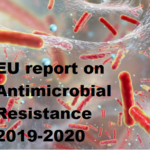A multistate outbreak of Salmonella Senftenberg linked to Jif peanut butter products produced at the J.M. Smucker Company factory in Lexington, Kentucky. J.M. Smucker recalled the affected products from the market on May 20, 2022. The outbreak caused 16 illnesses and two hospitalizations in 12 States. A cascade effect followed as many companies use Jif peanut butter in their products. The recall went internationally since the recalled products were also shipped to many countries. While the Jif peanut butter recall caused a significant ripple effect, it is not one of the most extensive outbreaks due to Salmonella in peanut butter....
ruth
ruth
According to the WHO, antibiotic resistance is increasing to dangerous levels worldwide. Novel resistance mechanisms are emerging and spreading globally. There are numerous mechanisms reported for antibiotic resistance. In some cases, as bacteria adapt to the continuous presence of antibiotics, it becomes increasingly more resistant. Resistant bacteria are much more challenging to get rid of and control infections that they cause. Today, the need for effective antibiotics is more critical than ever. However, few new antibiotics are in the development pipeline. Consequently, food pathogens should not be antibiotic-resistant. The European Center for Disease Prevention and Control (ECDC) and the European...
ruth
On February 17, 2022, the FDA announced that it is investigating four consumer complaints of infant illness- related to products from Abbott Nutrition’s Sturgis, MI facility. The FDA received consumer complaints about infants who had consumed powdered infant formula produced by Abbott Nutrition’s Sturgis, MI facility. These complaints include three reports of Cronobacter sakazakii infections and one of Salmonella Newport infection of infants. All four cases related to these complaints were hospitalized, and the Cronobacter may have contributed to a death in one case. On the same day of the FDA notice, the CFIA announced their recall of the Abbott...
ruth
WHO estimates that around the world, almost 1 in 10 people gets sick eating contaminated food each year. Food contamination results in 420,000 deaths and the loss of 33 million healthy life years. Food safety is a global issue, but each outbreak is local. All countries are not equal in their food safety achievements. To better understand food safety globally, we are looking for volunteers to help us cover the world in our group and on the adjacent website http://ask-bioexpert.com/. We are asking for help covering recalls, outbreaks, and new regulations worldwide. Also, it is essential to include new technologies...




